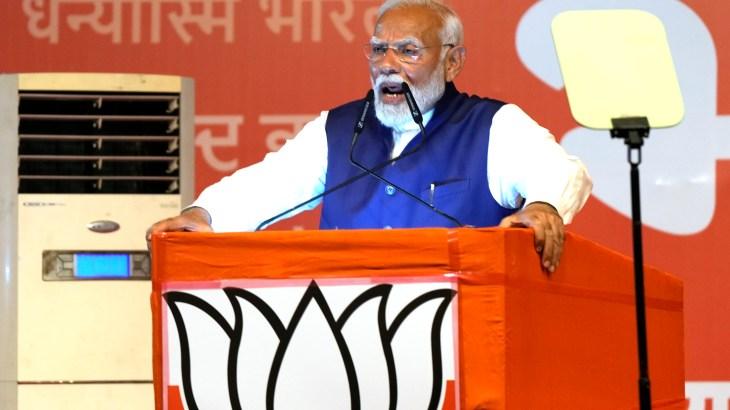Explore the alliances Narendra Modi relies on after falling short of a majority in the 2024 elections.
Prime Minister Narendra Modi has announced his intention to form the next government for a third consecutive term. However, he now requires support from allies as his Bharatiya Janata Party (BJP) fell short of the majority mark in the recent elections, a deviation from its 2014 performance.
The BJP's victory secured 240 seats in the Lok Sabha, signaling a significant electoral setback as earlier projections indicated a more substantial win for the Hindu nationalist party. The National Democratic Alliance (NDA), under BJP leadership, clinched 53 seats, consolidating a total strength of 293 – exceeding the 272 seat threshold essential for government formation.
Noteworthy is the NDA's coalition dynamics, particularly the historical oscillations among its allies who have alternated between supporting the BJP and siding with the opposition. Following a recent gathering of NDA partners, they reaffirmed their support for the BJP and Narendra Modi as the frontrunners to lead the upcoming government.
The article delves deeper into the major NDA allies, shedding light on their past alliances with the BJP and the evolving nature of their political relationships in the Indian landscape.
Janata Dal (United)
- The Janata Dal (United) secured 12 seats in Bihar during the 2024 elections, down by four seats from the 2019 polls. The party's spokesperson, KC Tyagi, confirmed their allegiance to Narendra Modi and disavowed any return to the Congress-led Indian National Developmental Inclusive Alliance (INDIA) coalition.
- Notably, Nitish Kumar, the JD(U) leader and current Bihar Chief Minister, played a pivotal role in the erstwhile INDIA alliance but has since shifted alliances over the years. The JD(U) has notably collaborated with both the BJP and the Congress party, showcasing a penchant for strategic realignments to suit the political climate.
- The JD(U)'s political agility was prominently displayed in past instances, such as its withdrawal from the INDIA alliance to join forces with the BJP in a move that bolstered the NDA's electoral fortunes in Bihar. The party's history includes alliances with various factions and a nuanced approach towards coalition building.
- Despite instances of friction, like the fallout over Narendra Modi's candidacy in the 2014 elections, the JD(U) has maintained its secular positioning and leveraged support from diverse voter segments to navigate the political landscape effectively.
- The JD(U)'s alliance dynamics have shaped Bihar's political landscape significantly, with strategic moves influencing electoral outcomes and governmental configurations over the years.
Telugu Desam Party (TDP)
- In the 2024 elections, the Telugu Desam Party secured 16 seats in Andhra Pradesh, a substantial increase from its 2019 performance. Led by N Chandrababu Naidu, the party pledged support to the BJP, signaling cooperation in creating a viable political landscape.
- The TDP has a rich history, having been a part of various alliances and political groupings since its inception. Noteworthy is its engagement with the BJP, culminating in different periods of collaboration and discord based on ideological and strategic considerations.
- The party's departure from the NDA in 2018, owing to disagreements with PM Modi over financial support, underscored the complexities of coalition politics in India. Despite turbulent phases, the TDP managed to realign with the BJP before the recent elections, augmenting its electoral prospects in Andhra Pradesh.
- The TDP's fluid alliance strategies and formidable presence in Andhra Pradesh have significantly impacted the region's political dynamics and contributed to the party's electoral clout over time.
Shiv Sena (SHS) – Eknath Shinde
- With seven seats secured in Maharashtra in the 2024 elections, the Shiv Sena (SHS) under Eknath Shinde's leadership continues to be a prominent political entity in the state. The party's emergence from factional splits and subsequent realignments underscore its resilience within the political sphere.
- The historical evolution of the Shiv Sena, founded by Bal Thackeray, reflects a journey marked by shifting alliances and ideological contours. Its engagement with the BJP and participation in coalition governments have defined Maharashtra's political landscape over the years.
- Despite facing allegations of sectarianism and controversy, the Shiv Sena's enduring presence in Maharashtra underscores its political significance and enduring influence within the state's dynamic political ecosystem.
Nationalist Congress Party (NCP) – Ajit Pawar
- The Nationalist Congress Party (NCP), led by Ajit Pawar, secured one seat in Maharashtra during the 2024 elections, marking a modest electoral presence. Key strategic decisions and leadership transitions have characterized the party's trajectory, highlighting its adaptability within the evolving political milieu.
- The NCP's history of alliances, notably with the Congress and participation in the United Progressive Alliance (UPA), underscores its commitment to regional issues and secular principles. Aligning with the NDA in recent times, Ajit Pawar's articulated alignment with Modi's development agenda reflects a strategic convergence aimed at addressing governance priorities.
- The NCP's nuanced positioning and engagement with diverse political forces have shaped Maharashtra's political landscape, with a blend of regional concerns and national imperatives guiding its strategic directions.
Lok Janshakti Party (LJPRV) – Ram Vilas
- The Lok Janshakti Party secured five seats in Bihar during the 2024 elections, consolidating its position within the state's political dynamics. The party's emergence as a distinct political entity reflects the evolving landscape of Bihar's electoral scene and the strategic recalibrations within regional politics.
- Founded as a breakaway faction, the LJPRV's evolution and subsequent alignment with the NDA underscore its penchant for navigating the complex alliances prevalent in Bihar. The party's lineage and leadership transitions showcase a blend of familial legacies and electoral calculations influencing its political journey over time.
- The LJPRV's engagement with broader political forces and strategic alignments underscore its role in shaping Bihar's electoral outcomes and contributing to the state's political landscape.
Source: ALJAZEERA
ALJAZEERA MEDIA NETWORK
